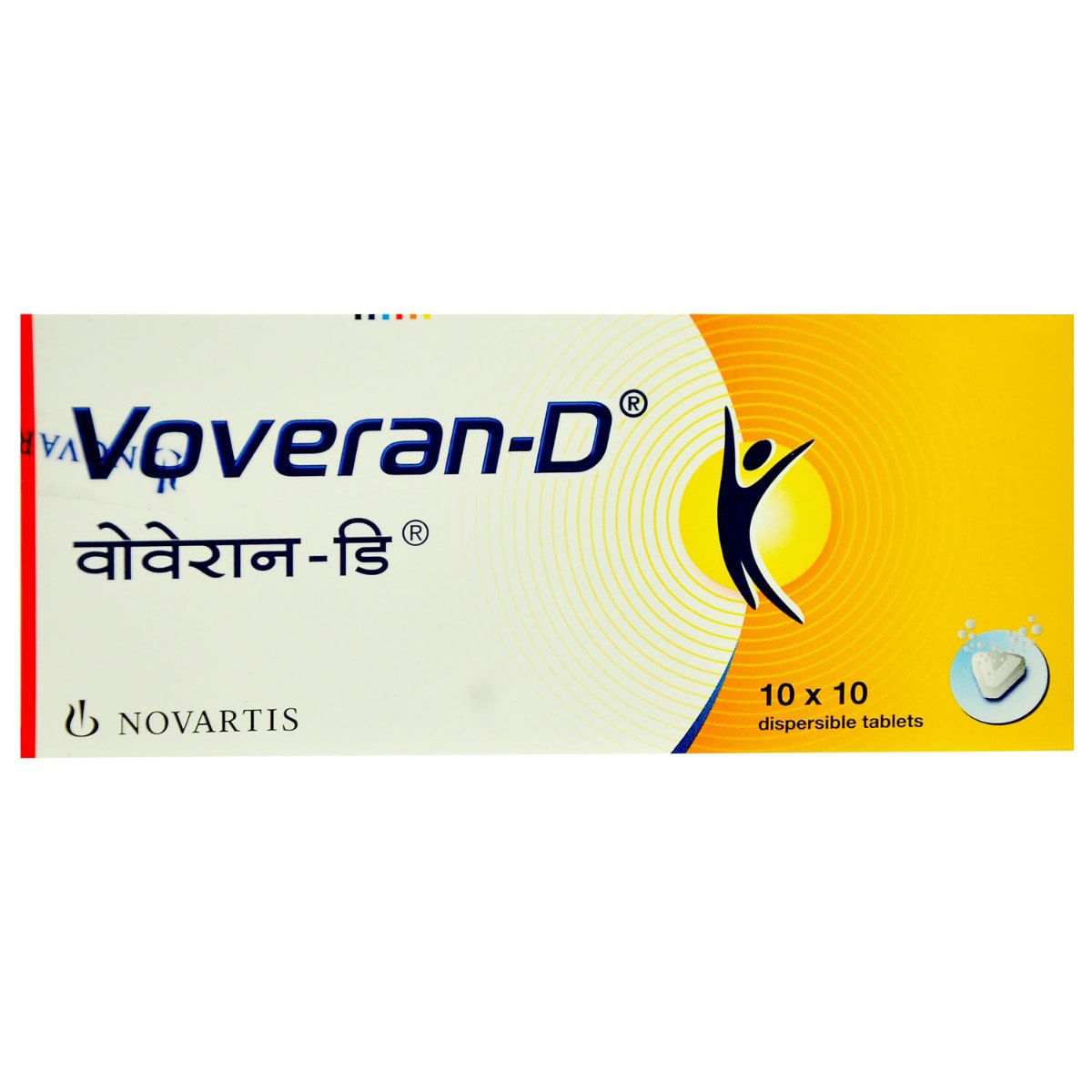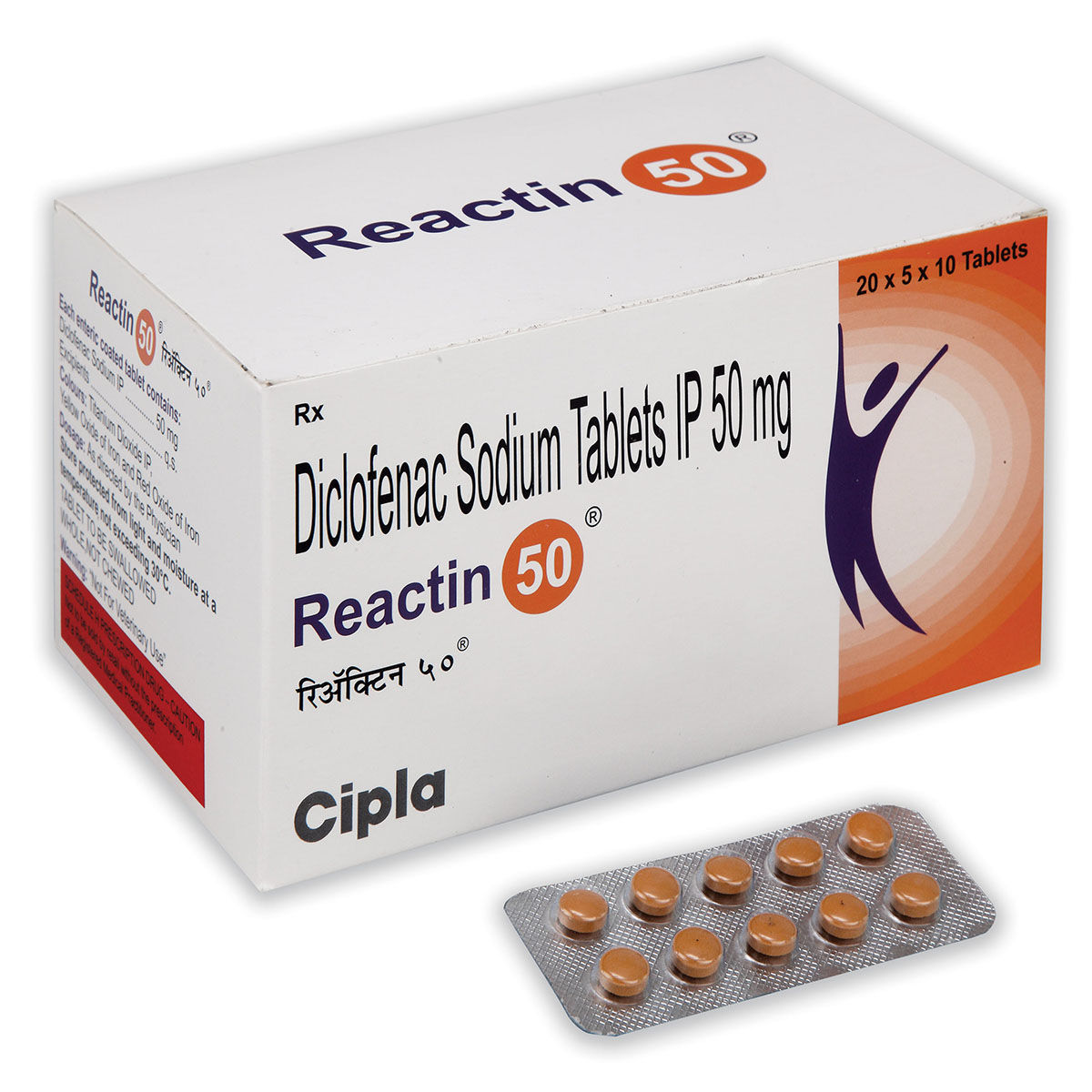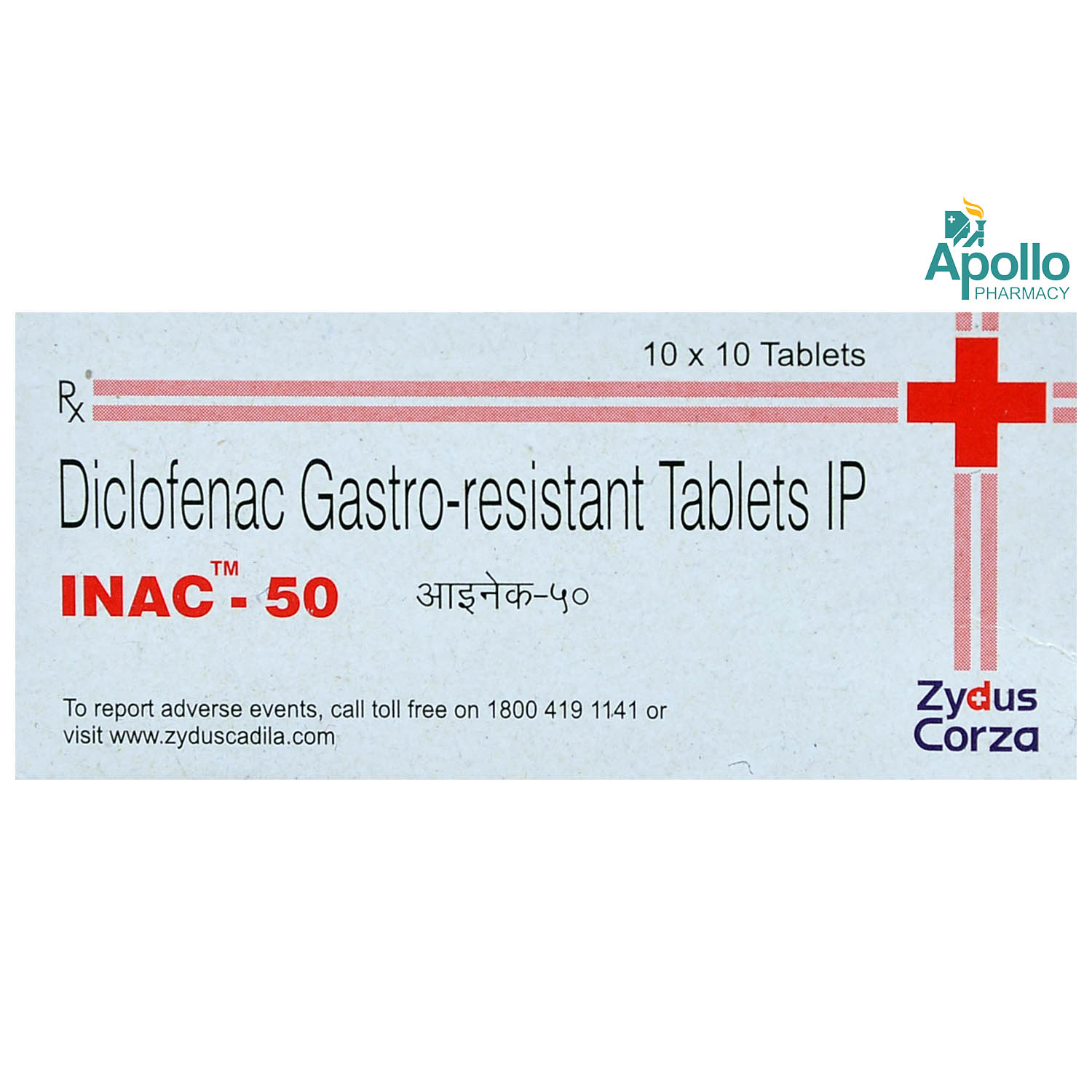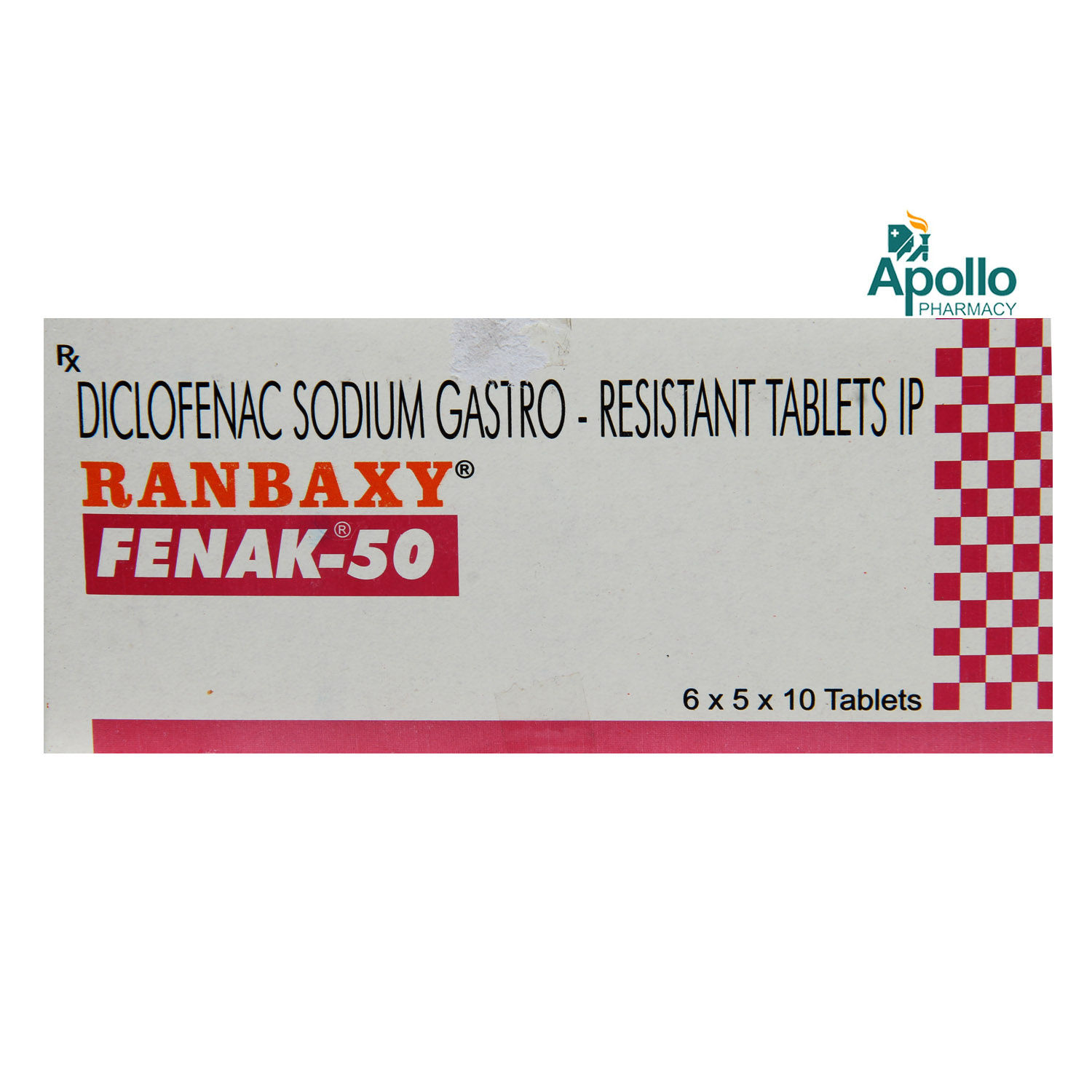Kiemed Diclofenac Sodium 50 mg Tablet 10's

₹8.1*
MRP ₹9
10% off
₹7.65*
MRP ₹9
15% CB
₹1.35 cashback(15%)
Free Delivery
With Circle membership
(Inclusive of all Taxes)
This offer price is valid on orders above ₹800. Apply coupon PHARMA10/PHARMA18 (excluding restricted items)
Kiemed Diclofenac Sodium 50 mg Tablet is used to relieve pain and inflammation associated with migraine, muscle pain, dental pain, rheumatoid arthritis, ankylosing spondylitis, osteoarthritis, gout, strain, and sprain. It contains Diclofenac, which works by blocking the effect of an enzyme called cyclo-oxygenase (COX) that produces prostaglandins responsible for pain and inflammation. Thereby, it provides relief from pain and inflammation. It may cause certain side effects such as stomach pain, heartburn, nausea, vomiting, diarrhea, indigestion, loss of appetite, headache, and dizziness. Before taking this medicine, you should tell your doctor if you are allergic to any of its components or if you are pregnant/breastfeeding, and about all the medications you are taking and pre-existing medical conditions.
Know Your Delivery Time
Provide Delivery Location
Available Offers
 Prescription drug
Prescription drugWhats That

Secure Payment

India's Most Trusted Pharmacy

Genuine Products
Synonym :
Composition :
Manufacturer/Marketer :
Consume Type :
Return Policy :
Expires on or after :
NPPA :
About Kiemed Diclofenac Sodium 50 mg Tablet
Kiemed Diclofenac Sodium 50 mg Tablet belongs to a group of medicines called non-steroidal anti-inflammatory drugs (NSAIDs) used to relieve pain and inflammation associated with migraine, muscle pain, dental pain, rheumatoid arthritis, ankylosing spondylitis, osteoarthritis, gout, strain, and sprain. Pain is an unpleasant sensation and emotional experience associated with tissue damage.
Kiemed Diclofenac Sodium 50 mg Tablet contains Diclofenac, which works by blocking the effect of an enzyme called cyclo-oxygenase (COX) that produces prostaglandins that are responsible for the sense of pain and inflammation. Thereby, Kiemed Diclofenac Sodium 50 mg Tablet provides relief from pain and inflammation.
Kiemed Diclofenac Sodium 50 mg Tablet should be taken as prescribed. This medicine may cause certain side effects, such as stomach pain, heartburn, nausea, vomiting, diarrhea, indigestion, loss of appetite, headache, and dizziness. Most of these side effects do not require medical attention and gradually resolve over time. However, if the side effects are persistent, contact your doctor.
Kiemed Diclofenac Sodium 50 mg Tablet should be avoided if allergic to it. Inform your doctor if you have stomach ulcers, gastric bleeding, severe heart failure, high blood pressure and liver or kidney disease before taking Kiemed Diclofenac Sodium 50 mg Tablet . Consult your doctor if you are pregnant, planning for pregnancy or breastfeeding. Kiemed Diclofenac Sodium 50 mg Tablet may cause dizziness; therefore, drive only if you are alert. Avoid alcohol consumption as it may cause increased dizziness and stomach irritation. Kiemed Diclofenac Sodium 50 mg Tablet is not recommended for use in children below 12 years of age as safety is not established.
Uses of Kiemed Diclofenac Sodium 50 mg Tablet
• Pain and inflammation Relief: Kiemed Diclofenac Sodium 50 mg Tablet provides relief from moderate to severe pain and inflammation, helping with headaches, toothaches, post-operative pain, and other conditions.
• Arthritis Management: Kiemed Diclofenac Sodium 50 mg Tablet helps to manage arthritis by reducing inflammation and pain, improving joint function and mobility in conditions like rheumatoid arthritis and osteoarthritis.
• Muscle Pain Treatment: Kiemed Diclofenac Sodium 50 mg Tablet can relieve muscle pain caused by strains, injuries, or overexertion.
• Menstrual Pain Relief: Kiemed Diclofenac Sodium 50 mg Tablet helps in alleviating menstrual cramps and discomfort associated with dysmenorrhea.
• Post-Trauma Pain Management: Kiemed Diclofenac Sodium 50 mg Tablet also helps manage post-traumatic pain and inflammation, supporting recovery and rehabilitation after injuries.
Directions for Use
Kiemed Diclofenac Sodium 50 mg Tablet should be taken with food to avoid stomach upset. Swallow the medicine as a whole with water. Do not crush or chew it.
Medicinal Benefits
Kiemed Diclofenac Sodium 50 mg Tablet belongs to a group of medicines called non-steroidal anti-inflammatory drugs (NSAIDs). It relieves mild to moderate pain, swelling, and joint stiffness caused by arthritis. It is also helpful in acute migraine, muscle pain, dental pain, gout, sprain, and strain. Kiemed Diclofenac Sodium 50 mg Tablet works by blocking the effect of an enzyme called cyclo-oxygenase (COX) that produces prostaglandins responsible for the sense of pain and inflammation.
How Kiemed Diclofenac Sodium 50 mg Tablet Works
Storage
- Inform your doctor about the nausea and discuss possible alternatives to the medication or adjustments to the dosage.
- Divide your daily food intake into smaller, more frequent meals to reduce nausea.
- Opt for bland, easily digestible foods like crackers, toast, plain rice, bananas, and applesauce.
- Avoid certain foods that can trigger nausea, such as fatty, greasy, spicy, and smelly foods.
- Drink plenty of fluids, such as water, clear broth, or electrolyte-rich beverages like coconut water or sports drinks.
- Use ginger (tea, ale, or candies) to help relieve nausea.
- Get adequate rest and also avoid strenuous activities that can worsen nausea.
- Talk to your doctor about taking anti-nausea medication if your nausea is severe.
- Record when your nausea occurs, what triggers it, and what provides relief to help you identify patterns and manage your symptoms more effectively.
- High levels of liver enzymes need immediate medical attention.
- Watch your diet and consume low-fat foods, like green leafy vegetables, fish, whole grains, nuts, etc.
- Regularly do strengthening exercises to control your cholesterol levels.
- Avoid drinking alcohol as it can affect your liver.
- Focus on losing weight as it can help control cholesterol and maintain liver enzymes.
- Practice yoga and meditation to improve liver functioning and overall health.
- Limit processed foods and eat more vegetables and fruits.
- Exercise at least 30 minutes every day.
- Maintain a healthy weight.
- Quit smoking as it can worsen kidney damage.
- Control your blood pressure and blood glucose.
- Limit salt intake and alcohol consumption.
- Increased creatinine levels must be corrected immediately with the help of a doctor.
- Reduce strenuous activities that can lead to muscle breakdown and production of creatinine.
- Sleep for 7-8 hours per night to assist your body in repairing and rebuilding tissue.
- Manage your blood pressure by implementing changes in lifestyle like losing weight, reducing stress and exercising regularly.
- Avoid smoking and drinking alcohol.
- Report the itching to your doctor immediately; they may need to change your medication or dosage.
- Use a cool, damp cloth on the itchy area to help soothe and calm the skin, reducing itching and inflammation.
- Keep your skin hydrated and healthy with gentle, fragrance-free moisturizers.
- Try not to scratch, as this can worsen the itching and irritate your skin.
- If your doctor prescribes, you can take oral medications or apply topical creams or ointments to help relieve itching.
- Track your itching symptoms and follow your doctor's guidance to adjust your treatment plan if needed. If the itching persists, consult your doctor for further advice.
- Include iron-rich foods like dark leafy vegetables, lean red meat, legumes and fish in your diet.
- Consume vitamin C-rich foods as they aid iron absorption.
- Limit tea, cocoa, and coffee as these can slow iron absorption.
- Exercise regularly; however, do not overdo it.
- Boost Vitamin K with leafy greens (spinach, kale), broccoli, cauliflower, and cabbage.
- Include iron-rich foods like lean red meat, legumes, fortified cereals, and dark leafy greens.
- Stay hydrated by drinking plenty of water.
- Add Vitamin C-rich foods (citrus fruits, bell peppers) to enhance iron absorption.
- Limit excessive alcohol and blood-thinning foods like garlic and certain herbs.
- Engage in gentle exercise like walking, swimming, or yoga.
- Monitor injuries and apply pressure to wounds promptly.
- Schedule regular medical checkups for routine blood tests.
What if I have taken an overdose of Kiemed Diclofenac Sodium 50 mg Tablet
Drug Warnings
Avoid taking Kiemed Diclofenac Sodium 50 mg Tablet if you are allergic to any of its components. Avoid taking Kiemed Diclofenac Sodium 50 mg Tablet if you have recently had heart bypass surgery, as it may increase the risk of heart attack or stroke. Be cautious as Kiemed Diclofenac Sodium 50 mg Tablet may also increase the risk of stomach or intestinal bleeding. Inform your doctor if you have stomach ulcers, gastric bleeding, severe heart failure, high blood pressure and liver or kidney disease. If you have/had a severe allergy to painkillers and have conditions like asthma, rhinitis, angioedema (swelling under the skin) or skin rashes, do not take Kiemed Diclofenac Sodium 50 mg Tablet . Kiemed Diclofenac Sodium 50 mg Tablet not recommended for children under 12 years of age. Consult your doctor if you are pregnant or breastfeeding.
Drug-Drug Interactions
Drug-Drug Interactions
Login/Sign Up
Co-administration of Kiemed Diclofenac Sodium 50 mg Tablet with Meloxicam can increase the risk or severity of gastrointestinal side effects.
How to manage the interaction:
Taking Meloxicam with Kiemed Diclofenac Sodium 50 mg Tablet is not recommended as it can possibly result in an interaction, it can be taken if your doctor has advised it. However, consult your doctor immediately if you experience symptoms such as dizziness, lightheadedness, red or black, tarry stools, coughing up or vomiting fresh or dried blood that looks like coffee grounds, severe headache, and weakness. Do not stop any medication without doctor's advise.
Taking Kiemed Diclofenac Sodium 50 mg Tablet with Vorapaxar can increase the risk of bleeding complications.
How to manage the interaction:
There may be a possible interaction between Kiemed Diclofenac Sodium 50 mg Tablet and Vorapaxar, but they can be taken together if your doctor has prescribed them. However, consult your doctor immediately if you experience any unusual bleeding, dizziness, lightheadedness, red or black, tarry stools, coughing up or vomiting fresh or dried blood that looks like coffee grounds, severe headaches. Do not discontinue any medications without consulting your doctor.
Co-administration of Kiemed Diclofenac Sodium 50 mg Tablet with tacrolimus may cause kidney problems.
How to manage the interaction:
Co-administration of Kiemed Diclofenac Sodium 50 mg Tablet and Tacrolimus can lead to an interaction, it can be taken if advised by your doctor. However, consult your doctor if you experience nausea, vomiting, loss of hunger, increased or decreased urination, sudden weight gain or weight loss, fluid retention, swelling, shortness of breath, muscle cramps, tiredness, weakness, dizziness, confusion, and irregular heart rhythm. Do not stop using any medications without a doctor's advice.
Taking Kiemed Diclofenac Sodium 50 mg Tablet and oxaprozin can increase the risk of side effects.
How to manage the interaction:
Co-administration of Kiemed Diclofenac Sodium 50 mg Tablet and oxaprozin can lead to an interaction; it can be taken if advised by your doctor. However, if you experience any symptoms like unusual bleeding or bruising, dizziness, lightheadedness, red or black, tarry stools, coughing up or vomiting fresh or dried blood that looks like coffee grounds, severe headache, and weakness, consult your doctor immediately. Do not stop using any medications without a doctor's advice.
Co-administration of Kiemed Diclofenac Sodium 50 mg Tablet with tenofovir disoproxil may increase the risk of developing kidney problems.
How to manage the interaction:
There may be a possible interaction between Kiemed Diclofenac Sodium 50 mg Tablet and Tenofovir disoproxil but they can be taken together if your doctor has prescribed them. However consult your doctor immediately if you experience symptoms such as such as nausea, vomiting, loss of appetite, increased or decreased urination, sudden weight gain or weight loss, swelling, shortness of breath, bone pain, muscle cramps, tiredness, weakness, dizziness, confusion, and irregular heart rhythm. Do not stop using any medications without first talking to your doctor.
Co-administration of methotrexate with Kiemed Diclofenac Sodium 50 mg Tablet can increase the levels and effects of methotrexate. This can lead to increased risk of side effects.
How to manage the interaction:
Although there is a possible interaction between methotrexate and Kiemed Diclofenac Sodium 50 mg Tablet, you can take these medicines together if prescribed by your doctor. However, if you experience any symptoms such as mouth sores or ulcers, nausea, vomiting, diarrhea, rash, loss of hunger, joint pain or swelling, yellowing of the skin or eyes, dark urine, shortness of breath, a dry cough, paleness, dizziness or fainting, unusual bruising or bleeding, fits, infection, fever, chills, body aches, sore throat or muscle weakness, consult a doctor immediately. Do not stop using medications without a doctor's advice.
Taking Kiemed Diclofenac Sodium 50 mg Tablet with bromfenac will have an additive effect and may increase the risk of side effects in the gastrointestinal tract such as inflammation, bleeding, ulceration, and rarely, perforation.
How to manage the interaction:
There may be possible interaction between Kiemed Diclofenac Sodium 50 mg Tablet and bromfenac but you can take it if prescribed by a doctor. Consult your doctor if you experience any unusual bleeding or bruising or have other signs and symptoms of bleeding such as dizziness; lightheadedness; red or black, tarry stools; coughing up or vomiting fresh or dried blood that looks like coffee grounds; severe headache; and weakness. Do not stop using any medications without first talking to your doctor.
Taking amiloride with Kiemed Diclofenac Sodium 50 mg Tablet can increase the risk of kidney problems, hyperkalemia(high potassium levels in blood), and high blood pressure.
How to manage the interaction:
There could be a possible interaction between Kiemed Diclofenac Sodium 50 mg Tablet and amiloride, but they can be taken together if your doctor has prescribed them. However, if you experience any unusual symptoms contact your doctor immediately. Do not stop using any medications without first talking to your doctor.
Taking prasugrel together with Kiemed Diclofenac Sodium 50 mg Tablet may increase the risk of bleeding.
How to manage the interaction:
Co-administration of Kiemed Diclofenac Sodium 50 mg Tablet and Prasugrel can lead to an interaction; it can be taken if advised by a doctor. However, if you experience any symptoms like unusual bleeding or bruising, dizziness, lightheadedness, red or black, tarry stools, coughing up or vomiting fresh or dried blood that looks like coffee grounds, severe headache, and weakness, consult your doctor immediately. Do not stop using any medications without a doctor's advice.
Co-administration use of Kiemed Diclofenac Sodium 50 mg Tablet with Flubiprofen may increase the risk of stomach bleeding and ulcers.
How to manage the interaction:
There is a possibility of interaction between Kiemed Diclofenac Sodium 50 mg Tablet and Flubiprofen but they can be taken together if your doctor has prescribed them. Consult your doctor immediately if you experience any symptoms like Nausea, red or black, tarry stools, coughing up or vomiting fresh or dried blood that looks like coffee grounds, burning in stomach, acidity, severe headache and weakness. Do not stop using any medications without first talking to your doctor.
Drug-Food Interactions
Drug-Food Interactions
Login/Sign Up
Diet & Lifestyle Advise
- Include turmeric and fish oils, as they help in reducing inflammation.
- Please do not go for heavy exercise as it may increase joint pain and arthritis. Instead, you can do stretching and impact aerobic exercises like walking on a treadmill, bike riding and swimming. You can also strengthen your muscle strength by lifting light weights.
- Include fish like salmon, trout, tuna and sardines. These fishes are enriched with omega-3 fatty acids that ramp up inflammation.
- Your sitting posture is important, especially when you have pain and inflammation conditions. Try to sit as little as possible and only for a short time (10-15 min). Use back support like a rolled-up towel at the back of the curve to minimise pain. Keep your knees and hips at a right angle. Besides this, you can use a footrest if required.
- Adopting a healthy lifestyle coupled with a diet containing high proteins is the mainstay in the management of arthritic conditions.
Habit Forming
Therapeutic Class
Kiemed Diclofenac Sodium 50 mg Tablet Substitute

Voveran D Tablet 10's
by Others
₹2.03per tabletReactin 50 Tablet 10's
by Others
₹1.24per tabletDensaid QA Sachet 1 gm
by Others
₹17.60per tabletInac-50 Tablet 10's
by Others
₹2.03per tabletVoveran 50 GE Tablet 15's
by Others
₹7.17per tablet
Product Substitutes
Alcohol
Unsafe
You are recommended not to consume alcohol along with Kiemed Diclofenac Sodium 50 mg Tablet to avoid unpleasant side effects.
Pregnancy
Unsafe
Kiemed Diclofenac Sodium 50 mg Tablet is not recommended during pregnancy. Please consult your doctor. Your doctor will prescribe an alternative medicine after overweighing the benefits over the risks.
Breast Feeding
Caution
There is not enough evidence to establish the safety of Kiemed Diclofenac Sodium 50 mg Tablet in nursing mothers. So, it is advisable to take Kiemed Diclofenac Sodium 50 mg Tablet only if prescribed by your doctor.
Driving
Caution
Kiemed Diclofenac Sodium 50 mg Tablet may cause dizziness. So avoid driving or drive only if you are alert.
Liver
Caution
If u have or had a history of any liver-related diseases, please consult the doctor before taking Kiemed Diclofenac Sodium 50 mg Tablet .
Kidney
Caution
If you have or had a history of kidney-related diseases, please consult the doctor before taking Kiemed Diclofenac Sodium 50 mg Tablet .
Children
Unsafe
Kiemed Diclofenac Sodium 50 mg Tablet not recommended for children under 12 years of age.

Have a query?
FAQs
Kiemed Diclofenac Sodium 50 mg Tablet is used to relieve pain and inflammation associated with migraine, muscle pain, dental pain, rheumatoid arthritis, ankylosing spondylitis, osteoarthritis, gout, strain, and sprain.
Kiemed Diclofenac Sodium 50 mg Tablet works by blocking the effect of an enzyme called cyclo-oxygenase (COX) that produces prostaglandins responsible for the sense of pain and inflammation. Thus, it provides relief from pain and inflammation.
Kiemed Diclofenac Sodium 50 mg Tablet can be stopped if it is prescribed for short-term pain relief. If it has been prescribed for long-term usage, it is advised to continue as advised by your doctor.
Kiemed Diclofenac Sodium 50 mg Tablet may cause dizziness in some patients. Drive only if you are alert after taking Kiemed Diclofenac Sodium 50 mg Tablet and omit driving if you feel dizzy.
No, Kiemed Diclofenac Sodium 50 mg Tablet is not indicated for stomach pain. If you have symptoms of stomach pain, contact your doctor.
Country of origin
Manufacturer/Marketer address
Disclaimer
Author Details
We provide you with authentic, trustworthy and relevant information























